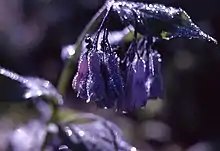| Mertensia ciliata | |
|---|---|
 | |
| Scientific classification | |
| Kingdom: | Plantae |
| Clade: | Tracheophytes |
| Clade: | Angiosperms |
| Clade: | Eudicots |
| Clade: | Asterids |
| Order: | Boraginales |
| Family: | Boraginaceae |
| Genus: | Mertensia |
| Species: | M. ciliata |
| Binomial name | |
| Mertensia ciliata | |
Mertensia ciliata is a species of flowering plant in the borage family known by the common names tall fringed bluebells, mountain bluebells, and streamside bluebells.
Distribution
It is native to the western United States, in California, Nevada, Utah, and Oregon. It often grows in moist habitat, such as subalpine meadows and creeksides. It often carpets large areas of meadow and hillside with blue-green foliage and sweet-scented bluebell blooms.[1]
Description
Mertensia ciliata is a perennial herb producing a cluster of erect stems from a thick, branching caudex. The leafy stems reach well over a meter in maximum height. The veiny leaves are oval to lance-shaped and pointed.
The inflorescence is an open array of many clustered blue bell-shaped flowers each between 1 and 2 centimeters long. The hanging, fragrant flower is tubular, expanding into a wider, lobed mouth. As the individual flowers progress in age they change in color from blue to pink-red.[2]
The flowers bear poricidal anthers and are fertilized via buzz-pollination by several Bombus species. Primary Nectar robbing by Bombus species, including Bombus occidentalis is common in some populations.
Uses
The flowers, young stems and leaves are edible raw;[3] older leaves (when the plant tends to be hairy) should be cooked. The plant contains alkaloids so should not be eaten in high quantities.[4]
References
- ↑ Southwest Colorado Wildflowers Archived 2008-07-24 at the Wayback Machine
- ↑ Barker, Joan. The Ultimate Guide to Wild Flowers of North America, page 249. Parragon. 2013.
- ↑ Montana Plant Life
- ↑ Nyerges, Christopher (2017). Foraging Washington: Finding, Identifying, and Preparing Edible Wild Foods. Guilford, CT: Falcon Guides. ISBN 978-1-4930-2534-3. OCLC 965922681.
External links
 Media related to Mertensia ciliata at Wikimedia Commons
Media related to Mertensia ciliata at Wikimedia Commons Data related to Mertensia ciliata at Wikispecies
Data related to Mertensia ciliata at Wikispecies- "Mertensia ciliata". Plants for a Future.
- Jepson Manual Treatment
- Mertensia ciliata in the CalPhotos photo database, University of California, Berkeley